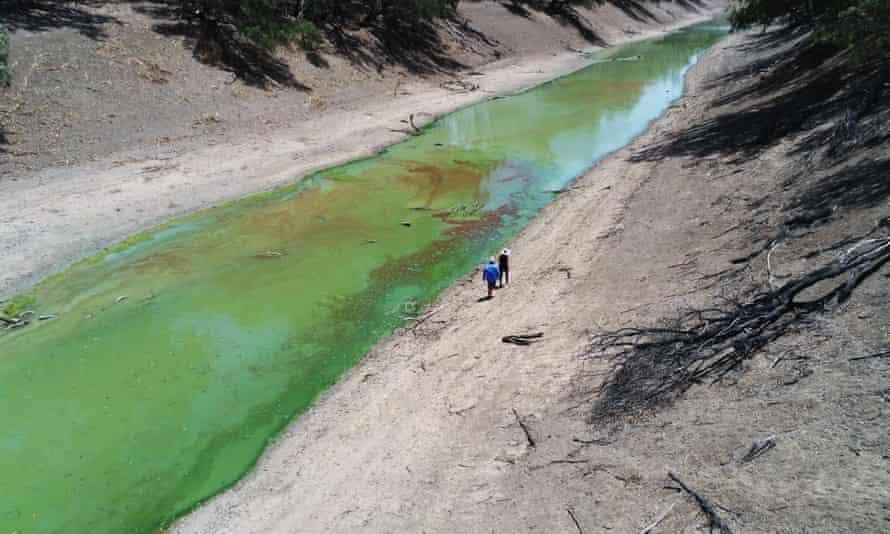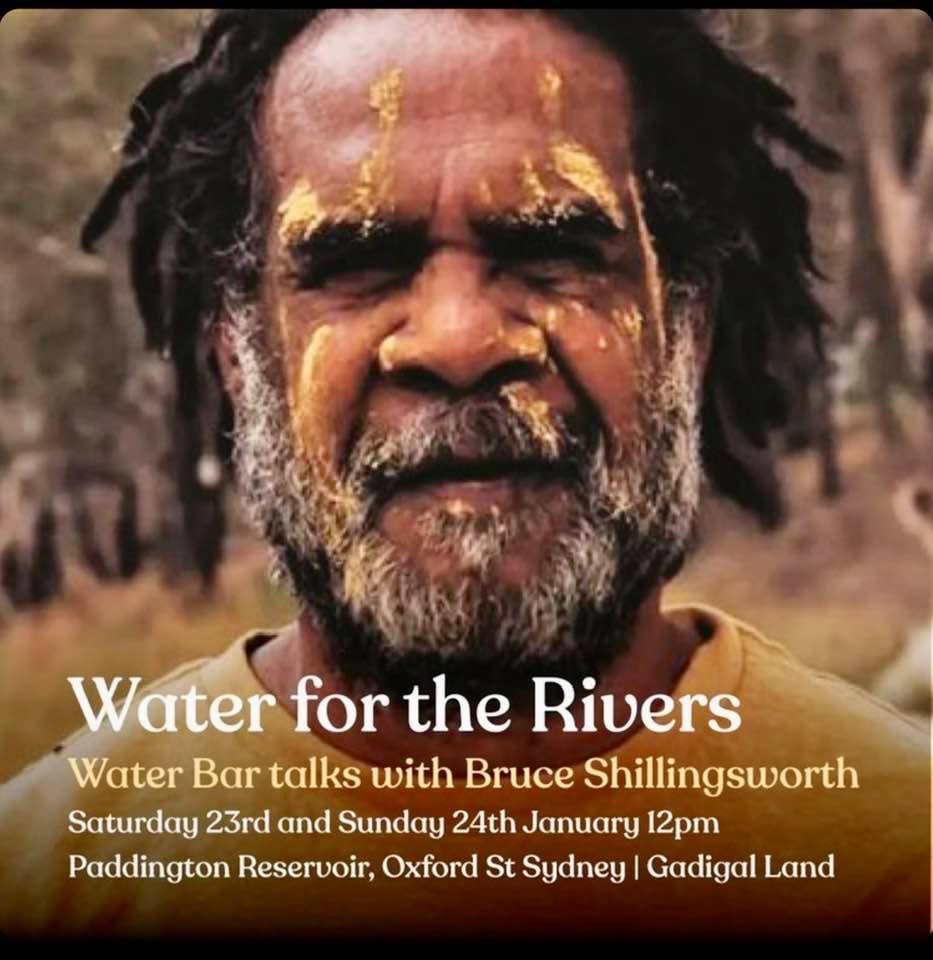Cry me a river…
Written by: Nick G. on 23 January 2021
 People living along the Barka (Darling) River remain angry at the lack of water coming down from southern Queensland and northern New South Wales.
People living along the Barka (Darling) River remain angry at the lack of water coming down from southern Queensland and northern New South Wales.
The Barka has always been susceptible to the effects of drought, but its near-total ruin is the result of capitalist greed. Supporters of the Barka refer to the 4 “Cs” – cotton, China, corporates, corruption.
Cotton is an extremely thirsty plant and much of its water is held throughout the year in very large, shallow dams. Cotton growers have been accused of illegal diversion of surface water (water in rivers and lakes) and floodwater harvesting (building levees and canals which then direct flood waters into giant storage tanks instead of allowing it to make its way into the river or into the soil.) This is unregulated and unmonitored in NSW – a case of a public good being seized by private hands without any action taken by government.
A person who had paddled down the Barka wrote on Facebook: “we saw the massive pumps when paddling down the Darling. Sometimes 4 of the biggest Catapillar motors inline pumping massive amounts of water. Open channels that have huge water losses.”
Another Facebook post reads: “Yep they bleed these rivers dry I understand drought but this is a man-made drought it’s about time something is done about this it’s all for bloody greed and money and cotton…”
Another post says: “Drought man-made because of over extraction of water upstream, licensed and illegally taken by the unlawful use of Flood Plain Harvesting, unmetered, unmeasured and unpaid for by thieves and endorsed by Politicians of all Major Parties both State and Federal ....Liberal, National and yes Labour parties by their silence not calling out and the opposition all have to answer as to why they are allowing the destruction of our waterways…”
Yet another complains, “Flood plains harvesting is killing our rivers system and making droughts longer and more difficult to cope with. Water from the floods belongs to every one along the entire river systems from streams creeks billabongs and our rivers.”
China is a major purchaser of Australia water entitlements. Part of that is linked to its involvement in cotton growing. According to the Australia Tax Office’s Register of Foreign Ownership, in 2019 China owned 1.9% of Australia’s total water entitlements, but was closely followed by the US (1.8%) and the UK (1%). Although these figures seem small, the private water market is still relatively young and the foreign share is growing. Foreign held water entitlements in Northern Murray Darling Basin (MDB) increased by 32.5% between 2018-9.
Corporates include the huge agribusinesses that have purchased prime agricultural land and turned it over to heavily water dependent single crops including cotton, but also including almonds and walnuts. Single cropping over huge areas contributes to loss of biodiversity. They also include finance companies speculating in “blue gold” (water) now that water entitlements can be bought by companies not involved in irrigation and held until rising prices make resale profitable enough.
A Facebook comment on corporations reads: “Corporations do not give a f**k about what happens as a result of a board meeting or an operational decision. Communities on the Darling or indeed in the MDB are irrelevant and surplus to the corporations’ requirements. This is pretty obvious by the way they adhere to pumping rules and control politicians. Everything a corporation does is for its bottom line, expansion and shareholders and nothing else.”
Corruption refers to the NSW government and to the National Party at both state and federal levels. Australia’s “Watergate” – the scandal that saw Barnaby Joyce, then federal minister for agriculture, pay $80 million to buy back water from a company linked to then energy minister Angas Taylor, even though nearby water had been assessed at zero value.
As one Facebook commentator writes: “The corrupt bastards that govern our country haven’t got the guts to stand up to China or all the others that invest in water trading together they are killing our rivers and destroying our farmers, without water where will our food come from…”
But it is the National politicians in NSW who are being focused on in the Barka debate. Water minister Melinda Pavey has angered communities along the Barka by claiming on commercial TV stations that all storages, lakes and rivers are in flood and all is great. This Facebook post reveals the scorn with which many have greeted her claims: “would not trust her as far as I could piss into the wind, puppet for the northern irrigators and flood plains harvesting she lets them go willy nilly…”
Rob McBride of Tolarno Station writes: “The rivers and lakes are dying and by this occurring our First Nations traditions and cultures are being destroyed together with all our native fish species. The national party corrupts the liberals at every vote to drop transparency into water licences and ownership, the nationals must be obliterated at the next state and federal election if the rivers are ever going to get back to health.”
Contrary to the lies about the current health of the rivers peddled by Pavey on channels 7 and 9, locals know that “The River is in a horrific condition & the lakes barely exist as us locals remember.”
As the locals see it “The water stopped flowing over Bourke weir for two months. Once the flows stop there the lower part of the river drys up very quickly. In some parts near Loath and Wilcannia the river drys up completely so when water does come down from Bourke it’s always a first flow hence the muddy water look. Oh and the water stopped flowing over Bourke because the greedy cotton pricks took it all after the big rains early 2020.”
Another reports that “Menindee Lake is actually Totally Dry DRY DRY ...zilch in Menindee Lake ...Menindee Lake has NO ..None ...Nothing in it except dry Parched clay based soil, water being released is either from Pamaroo Lake or Lake Wetherall, part of the Menindee Lake Scheme which is currently under 20 % empty…”
Locals have offered their own solutions to the death of the Barka. One writes, “A first step would be no floodplain harvesting & extraction licences issued to land owners only, the water market is a big problem. Not to mention thirsty crops owned by mainly foreign investors. Fix them 3 points up & the once pristine Darling would be healthy again.”
First Peoples are keenly aware of the issues and Walgett Local Aboriginal Land Council called last year for the suspension of water trading in the Barwon Darling River System.
 There is a widespread awareness of the need to defend our water and the rivers that carry it. Nearly 31,000 people follow the Facebook page of Tolarno Station, while the Broken Hill-based Watershed Alliance Facebook page has two and a half thousand members and is supporting an event in Sydney this weekend at which Uncle Bruce Shillingsworth has issued the invitation, “Yaama come along and support our rivers (BAAKA) let’s stop the big greedy corporates taking over #WATERISLIFE”.
There is a widespread awareness of the need to defend our water and the rivers that carry it. Nearly 31,000 people follow the Facebook page of Tolarno Station, while the Broken Hill-based Watershed Alliance Facebook page has two and a half thousand members and is supporting an event in Sydney this weekend at which Uncle Bruce Shillingsworth has issued the invitation, “Yaama come along and support our rivers (BAAKA) let’s stop the big greedy corporates taking over #WATERISLIFE”.
There is a solid basis for unity between the organised working class movement and defenders of the rivers who by and large are opposed to foreign ownership, support biodiversity and the environment, and reject corporate greed and the corruption that sustains it.
(For a wider exploration of these and related issues, download our pdf book “Fight capitalism’s destructive impact on nature” here.)
Print Version - new window Email article
-----
Go back
Independence from Imperialism
People's Rights & Liberties
Community and Environment
Marxism Today
International
Articles
| Museum workers lead action to save SA Museum |
| Developers’ divisive dream: First Peoples’ lands to feed real estate bubble |
| Poverty in Australia: more entrenched than ever |
| Current trends in Australian agriculture |
| Barngarla join fight to reposition Pt. Lincoln desal plant |
| Global climate change hits dangerous new milestones in 2023 |
| Christmas: It’s all class… |
| The housing problem in Australia: caused by capitalism and capitalist social relations (reprint) |
| Did capitalist corner-cutting kill the Thylacine? |
| Will AUKUS turn us into the world’s nuclear waste dump? |
| For a United Front against Fossil Fuels and Feral Species |
| Capitalist interference disrupts Australian science |
| First Nations People Lead The Way In September |
| 70th anniversary of Emu Field A-Bomb tests approaches |
| Capitalism’s destructive war on nature causing ongoing extreme weather events. |
| University protests: welfare not warfare! |
| Greece is on fire and the system of profit is responsible. |
| Kimba nuclear dump decision – tears of joy. |
| Corporatisation of Universities Exposed |
| Copper mining (the new gold rush) should be publicly owned |
-----
